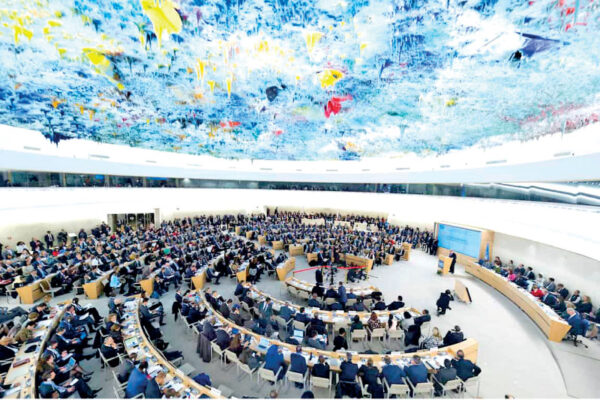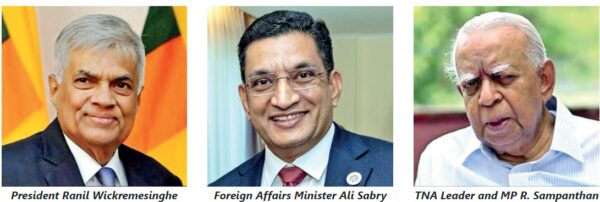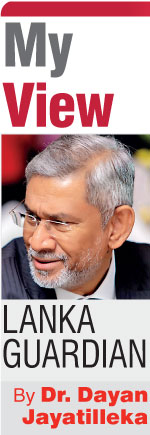Geneva 2022 meltdown and the coming contradiction with India-by Dr Dayan Jayathilaka


Source:FT
Perhaps as in 1983, the regime’s plan is to provoke ethnic/ethno-regional/ethno-religious tensions, thereby sundering or marginalising the inclusive, pluralist anti-regime movement for democracy, human rights and socioeconomic fair-play. However, the result may be that the largely Sinhala south will agitate against the economic selloffs while the Tamils of north and east will protest against cartographic subtraction, finally joining the Aragalaya or backing it with a second ‘P2P’. Realism suggests that Tamil politics pragmatically adopts the terminology of the UNHRC resolution and the statements of India at the October 2022 session as the parameters of the possible

A young mother and her little daughter were walking away hand in hand, at a measured pace, from Galle Face, having participated in the protest on 9 October. The mother was taking a selfie while walking, her other hand holding her daughter. Suddenly the Police bellowed that she should be caught, and both she and her kid were grabbed, the mother being pushed to the ground with the child wailing while a crowd yelled at the police and tried to rescue the mother and daughter. All of it was on TV news. Life under the Ranil Presidency. Ranil has effectively ruled out a parliamentary election in March 2023 when he is constitutionally empowered to hold one. With no mandate whatsoever to do anything of the sort, he declared that elections have to be held under a new electoral system, for which purpose he would appoint a Parliamentary Select Committee and declare a referendum by June-July if it hadn’t arrived at a consensus. He also said that the long-postponed and promised Local Authorities elections would be held only after the system of local government –including the Pradesheeya Sabhas, the innovative 1991 grassroots legacy of President Premadasa—was drastically altered.
System suicide
The implementation of Ranil’s bucket-list of unmandated and therefore illegitimate changes would take years. This is a deadly dangerous attempt to defer elections, our sole systemic safety-valve, at all levels, perhaps open-endedly. (President announces raft of amendments to electoral system | Daily FT)
Meanwhile the Rajapaksas’ Rottweiler pet political party the SLPP, urges that the promised 22nd Amendment intended to partially reverse the tyrannical 20th Amendment—the symbol of which remains the catastrophic lunacy of the fertiliser ban and its continuing consequences—should be replaced on the agenda by Gotabaya’s draft Constitution (authored by the Romesh de Silva committee) enshrining the hyper-centralist 20th Amendment, dissolving devolution and bearing the explicitly Trumpian Alt-Right spirit of 2019-2020.
The brutal shrinking of space for peaceful protest, the blocking of democratising Constitutional reform and extinguishing hope of early electoral change – or any election at all on schedule—may be a strategy of polarisation aimed at goading the Aragalaya and Left youth into violent resistance, which would furnish the pretext to unleash the military as baying hounds are in a fox-hunt. A cold, cynical ploy at any time, in the context of a constricting IMF package and imminent global recession, it could be systemically suicidal.
Turfed out prematurely by two Presidents, CBK and Sirisena, for behaving as if he was the President while he was only the PM, Ranil Wickremesinghe now behaves as if he is an elected President with a popular mandate, when he is an unelected, stand-in, stop-gap President. There’s no President to turf him out, though. Only the sovereign people.
Colombo’s Geneva collapse
A pithy Sinhala expression notes that “when they can’t dance, they say the dance-floor is lop-sided”. Foreign Minister Sabry is wrong to depict the UN Human Rights Council as a dice loaded against Sri Lanka and in favour of the West. A few hours after Sri Lanka crashed and burned in Geneva, China won a vote in the same forum on a resolution moved against it on Xinjiang.
When the Institution-Building (IB) package, the UNHRC’s constitution as it were, was gavelled through on 18 June 2007 in a dramatic session where the chair, Mexico’s ambassador Luis Alfonso de Alba, stopped the clock because there was a deadlock (which the Council’s Asian Group helped resolve), I was the head of the Asian group and elected a Vice-President of the UNHRC the next day. The UNHRC is built on the principle of proportional representation. Every region gets a number of representatives in accordance with its proportion of the world’s population. This gives a built-in majority to Africa, Latin America and the Asia-Pacific, not the collective West (including its East European allies).
If as Minister Sabry alleges, Sri Lanka crumbled in Geneva on his watch chiefly because ‘the powerful West’ lobbied the capitals, how to explain the votes for the resolution by three governments of the democratic Left in three major countries of Latin America, prominent propellants of Pink Tide 2.0, namely Mexico, Argentina and Honduras, the leaders of which warmly congratulated Brazil’s Lula on his Round 1 victory over Jair Bolsonaro and are cheering him on for the run-off on 30 October? They never take their cue from the US-UK.
Consider also the Resolution of the US Senate Foreign Relations Committee. One of the signatories/drivers is Senator Patrick Leahy, hardly a hawkish advocate of an imperialist foreign policy. He is the leading and senior-most voice in the US legislature and American politics of normalised relations with Cuba. He also moved to restrict US military assistance to Sri Lanka. Cuba has accumulated considerable soft power, while Sri Lanka has been driven by successive governments into bankruptcy in that domain too.
Abstentions mean the countries concerned did not wish to vote for you or the other side—not that they tacitly support you. Most relevant is where those abstentions came from. Did they come from states that used to vote for us, or against us, or always abstained? In which direction did the shift take place?
Go back to the 2009 vote-count and you can see the trend beginning 2012, of states, indeed parts of continents, regions, that voted heavily for Sri Lanka, starting to peel off, even vote against, and hitting a nadir this year under the Ranil presidency. The critical consensus on Sri Lanka clearly transcends the Left/Right, liberal/conservative and North/South divides.
Since 2012 when we first lost a vote after our resolution was decisively carried in 2009, Sri Lanka in peacetime has either been losing in Geneva (2012, 2013, 2014, 2021, 2022) or capitulating in Geneva (2015, 2017, 2019) and losing elections at home. Not since the UNHRC May 2009 has a Sri Lankan policy stance been equally acceptable internationally and nationally.
Returning to the Ranil-Mangala ‘hybrid courts-foreign judges’ co-sponsorship of 2015-2017 is politically suicidal. A Georgia Meloni-type hyper-nationalist backlash will burn through that administration’s popularity.
Geneva paradox
Ponder the Geneva paradox: a week after a decisively massive use of hard power in May 2009 climaxing 30 years of civil war, Sri Lanka generated enough soft power to win more votes at the UNHRC than the West has ever secured for any of its Sri Lanka resolutions, but has voided itself of that soft power in peacetime.
Over the years, international scholars critically researching the dramatic, unexpected 2009 outcome identify and attribute it to Sri Lanka’s ‘discourse strategy’ at the UNHRC in 2007-9. This confirms Ernesto Laclau and Chantal Mouffe’s insistence on the strategic decisiveness in the final analysis of “a complex set of discursive-hegemonic operations” on the intellectual plane. (HSS, Laclau & Mouffe, 1985, p. 174-5)
However, the covert postwar agenda of the hawks in the military, Gotabaya and Basil Rajapaksa and currently Ranil-Rajapaksa-MoD rule, was and is the exact antipode of the fulfilment of President Mahinda Rajapaksa’s and the GR-BR-Lalith troika’s wartime pledges on devolution made to India, reiterated in Mahinda’s immediate postwar pledges to India and the UN Secretary-General.
Transposed to the UN-Geneva arena, the hawkish postwar project was contrary to the international consensus undergirding Sri Lanka’s broad bloc constructed by our ‘diplomacy of discourse’ in 2007-2009.
Thus, I was sacked six weeks after we won the Geneva vote, the successful ‘discourse-construction’ discontinued, the coalition-building strategy abandoned, the politico-diplomatic positioning displaced, the team dispersed and structures dismantled (notably Prof. Rajiva Wijesinha and the Peace Secretariat). Even when the defeats started piling up in Geneva from 2012, we were never re-deployed.
|
Abrogating accord: Existential threat
The rollback of devolution, the 13th Amendment, Provincial Councils and the Indo-Sri Lanka Accord, constitutes the main axis of the postwar project of Sinhala-Buddhist hegemonism.
India is a pivotal power. For Sri Lanka, the support of India and China is both insufficient and imperative. ‘Insufficient’ because (thankfully) India, China and Russia cannot swing a victory for Myanmar at any UN forum. ‘Imperative’, because without both India and China, Sri Lanka can’t defend itself successfully in any global forum.
Sri Lanka didn’t lose India’s support; it forfeited it. The reason is clear from India’s explanation in Geneva this year. Sri Lanka hasn’t implemented the 13th Amendment and held elections to the Provincial Councils as pledged. Non-implementation of the 13th Amendment and continued freezing of elections to the Provincial Councils means that India is unlikely to vote for us, still less exercise its omni-directional influence to swing votes our way or neutralise the West. Many states take their cue from India in Asian matters.
Sri Lanka is teetering on the edge of a precipice of its relationship with India, a relationship ever more vital to this country at this moment of economic catastrophe. President Wickremesinghe is engaging in the high-risk gamble that he can trade-off chunks of economic real estate to Indian corporate interests while allowing the Sinhala hawks to carve out chunks of the historical habitat of the Tamil people in the North and East and unilaterally alter the area’s demography.
On 14 September 2022 the doyen of Tamil politics, R. Sampanthan, wrote to President Wickremesinghe on the dangerous designs being put into practice. Extracts follow:
“…I am also informed that certain proposals have been discussed to change District Secretaries and Divisional Secretaries areas in such a way as to severely distort historical habitation of land for generations and centuries by Tamils.
Under the Indo Sri Lanka Agreement, an international treaty, the Northern and Eastern provinces were accepted as areas of historical habitation of Tamil and Tamil speaking people.
I am now informed that in the Northern extremity of Trincomalee a larger chunk of land is said to be withdrawn from the Trincomalee District and replaced by a large piece of land from the Anuradhapura District in the North Central Province. Primary purpose of this is to rupture the linguistic contiguity of the Northern and Eastern Provinces.
A similar proposal is to be implemented in the south of the Trincomalee District bringing into the Eastern Province a large portion of land from the Polonnaruwa District whilst at the same time removing and attaching to the Polonnaruwa District a large block of land from the Trincomalee District Eastern Province.
This will result in the disruption of the maritime boundaries both to the North and South with the possibility of grave repercussions and grave consequences to the Trincomalee Harbour said to be the second best in the world.
Neither the Tamil speaking residents living in these areas nor our neighbor or closest countries would approve of this step. The whole objective of this is to extinguish the linguistic contiguity between the North and Eastern provinces on both North and South of Trincomalee District.
…The new proposal to bring land on the North from Anuradhapura from the North Central Province and on the South from Polonnaruwa in the North Central Province are all intended make the Sinhala people the majority in the Eastern Province, particularly a majority in the Trincomalee District. …Every one of the districts in the Northern and Eastern provinces is majority Tamil-speaking, and not a single District is majority Sinhala…”
Last week, M.A. Sumanthiran and Gajan Ponnambalam elaborated on this information in parliament. Sumanthiran’s sounds the siren:
“…I am going to table a document marked “Confidential – for official purposes only”, but I have a copy with me and I am placing it responsibly here, by the Ministry of Irrigation dated 26th September 2022, signed by Roshan Ranasinghe – Minister of Irrigation, in which you are tampering with the divisions. How the villages in the South of Mullaitivu district are going to be dealt with, how you are changing the administration in such a way that you are meddling with the ethnic composition and seeking to change the ethnic composition.
You have been trying to do this for several decades, you actually changed substantially the population of the East, now you are concentrating on the North of the Eastern Province, the North of Trincomalee district, and the South–East of the Northern District, the South of Mullaitivu district, and you are trying to bifurcate that natural linguistic contiguity by which the North and East are connected, it’s one region, there’s a natural contiguity.
But by these efforts – gerrymandering, changing administrative boundaries – you are trying to break that contiguity. Now this has very serious repercussions and I am asking that the government immediately halt these efforts using special laws such as Mahaweli, special laws such as forest ordinance, special laws such as archaeology…to suppress an ancient community merely because we are smaller in number, to deprive us of the areas of our historic habitation, and that area in the joined North and East, and if you don’t stop it’ll be a further disaster for this country.”
Neither the President, the PM nor Minister has contradicted these serious charges levelled by parliamentarians Sampanthan and Sumanthiran. If true, it poses nothing less than an existential threat to the Tamil community of the area—under the ‘liberal’ President Ranil Wickremesinghe.
It also signals the deliberate de-facto abrogation of the Indo-Sri Lanka Accord of 1987 and the rollback of the entire Indian diplomatic effort on the Tamil issue since G. Parthasarathy Sr. India’s Foreign Minister, Dr. Jaishankar, an old Sri Lanka hand like his Cabinet colleague Hardeep Puri, will spot the ‘creating demographic facts-on-the ground’ strategy from the Israeli-inspired Lalith Athulathmudali playbook of the 1980s when Jayewardene was President and Ranil was in Cabinet.
Perhaps as in 1983, the regime’s plan is to provoke ethnic/ethno-regional/ethno-religious tensions, thereby sundering or marginalising the inclusive, pluralist anti-regime movement for democracy, human rights and socioeconomic fair-play.
However, the result may be that the largely Sinhala south will agitate against the economic selloffs while the Tamils of north and east will protest against cartographic subtraction, finally joining the Aragalaya or backing it with a second ‘P2P’.
Realism suggests that Tamil politics pragmatically adopts the terminology of the UNHRC resolution and the statements of India at the October 2022 session as the parameters of the possible.
Wickremesinghe or Premadasa?
Instead of the scheduled 22nd Amendment, Ranil presented his perspective on the economic situation to Parliament. The myth of his mastery of economic policy was shot full of holes—20 to be exact—by Opposition leader Sajith Premadasa.
Explicitly re-committing to a social democratic policy framework and a social market economy, Premadasa listed 20 lacunae/errors in Wickremesinghe’s economic framework, for each of which he presented his counter-policies. Criticising the reliance on economic shrinkage, he cautioned against its consequences and sketched a growth strategy with an equity component.
Sajith’s 20-point speech showcased a pragmatic, progressive-centrist macroeconomic intervention in the crisis, conceptually and intellectually superior to that of Ranil anyone on either side of the parliamentary aisle. It implicitly answered the question: “given the economic crisis, if not Ranil, who?”
In Hambantota, the Rajapaksa fiefdom, Sajith Premadasa’s SJB swept the Multi-Purpose Cooperative Society election, shrinking the SLPP to double-digits last week.


 If as Minister Sabry alleges, Sri Lanka crumbled in Geneva on his watch chiefly because ‘the powerful West’ lobbied the capitals, how to explain the votes for the resolution by three governments of the democratic Left in three major countries of Latin America, prominent propellants of Pink Tide 2.0, namely Mexico, Argentina and Honduras, the leaders of which warmly congratulated Brazil’s Lula on his Round 1 victory over Jair Bolsonaro and are cheering him on for the run-off on 30 October? They never take their cue from the US-UK
If as Minister Sabry alleges, Sri Lanka crumbled in Geneva on his watch chiefly because ‘the powerful West’ lobbied the capitals, how to explain the votes for the resolution by three governments of the democratic Left in three major countries of Latin America, prominent propellants of Pink Tide 2.0, namely Mexico, Argentina and Honduras, the leaders of which warmly congratulated Brazil’s Lula on his Round 1 victory over Jair Bolsonaro and are cheering him on for the run-off on 30 October? They never take their cue from the US-UK




